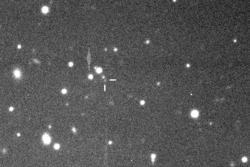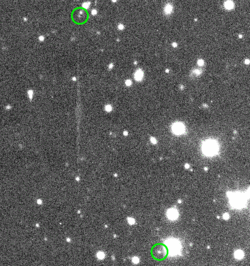Astronomy:Eurydome (moon)
 Discovery images of Eurydome by the Canada-France-Hawaii Telescope in December 2001 | |
| Discovery [1] | |
|---|---|
| Discovered by | Scott S. Sheppard David C. Jewitt Yanga R. Fernandez |
| Discovery site | Mauna Kea Observatory |
| Discovery date | 9 December 2001 |
| Designations | |
Designation | Jupiter XXXII |
| Pronunciation | /jʊˈrɪdəmiː/ |
| Named after | Ευρυδόμη Eyry̆domē |
| S/2001 J 4 | |
| Adjectives | Eurydomean /ˌjʊrɪdəˈmiːən/ |
| Orbital characteristics [2] | |
| Epoch 17 December 2020 (JD 2459200.5) | |
| Observation arc | 16.42 yr (5,998 days) |
| 0.1551793 astronomical unit|AU (23,214,490 km) | |
| Eccentricity | 0.2975371 |
| Orbital period | –722.59 d |
| Mean anomaly | 169.85622° |
| Mean motion | 0° 29m 53.536s / day |
| Inclination | 150.28897° (to ecliptic) |
| Longitude of ascending node | 31.50527° |
| 306.06428° | |
| Satellite of | Jupiter |
| Group | Pasiphae group |
| Physical characteristics[4] | |
| Mean diameter | 3 km |
| Albedo | 0.04 (assumed) |
| Apparent magnitude | 22.7[3] |
| Absolute magnitude (H) | 16.2[2] |
Eurydome /jʊˈrɪdəmiː/, also known as Jupiter XXXII, is a natural satellite of Jupiter. It was discovered concurrently with Hermippe by a team of astronomers from the University of Hawaii led by Scott S. Sheppard in 2001, and given the temporary designation S/2001 J 4.[5][1]
Eurydome is about 3 kilometres in diameter, and orbits Jupiter at an average distance of 23,231,000 km in 722.59 days, at an inclination of 149° to the ecliptic (147° to Jupiter's equator), in a retrograde direction and with an eccentricity of 0.3770.
It was named in August 2003 after Eurydome in Greek mythology, who is sometimes described as the mother of the Graces by Zeus (Jupiter).[6]
Eurydome belongs to the Pasiphae group, irregular retrograde moons orbiting Jupiter at distances ranging between 22.8 and 24.1 Gm, and with inclinations ranging between 144.5° and 158.3°.
References
- ↑ 1.0 1.1 MPEC 2002-J54: Eleven New Satellites of Jupiter 2002 May (discovery and ephemeris)
- ↑ 2.0 2.1 "M.P.C. 127088". Minor Planet Circular. Minor Planet Center. 17 November 2020. https://minorplanetcenter.net/iau/ECS/MPCArchive/2020/MPC_20201117.pdf.
- ↑ Sheppard, Scott. "Scott S. Sheppard - Jupiter Moons". Department of Terrestrial Magnetism. Carnegie Institution for Science. https://sites.google.com/carnegiescience.edu/sheppard/moons/jupitermoons.
- ↑ "Planetary Satellite Physical Parameters". Jet Propulsion Laboratory. 19 February 2015. https://ssd.jpl.nasa.gov/?sat_phys_par#jupiter.
- ↑ IAUC 7900: Satellites of Jupiter 2002 May (discovery)
- ↑ IAUC 8177: Satellites of Jupiter, Saturn, Uranus 2003 August (naming the moon)
 |


